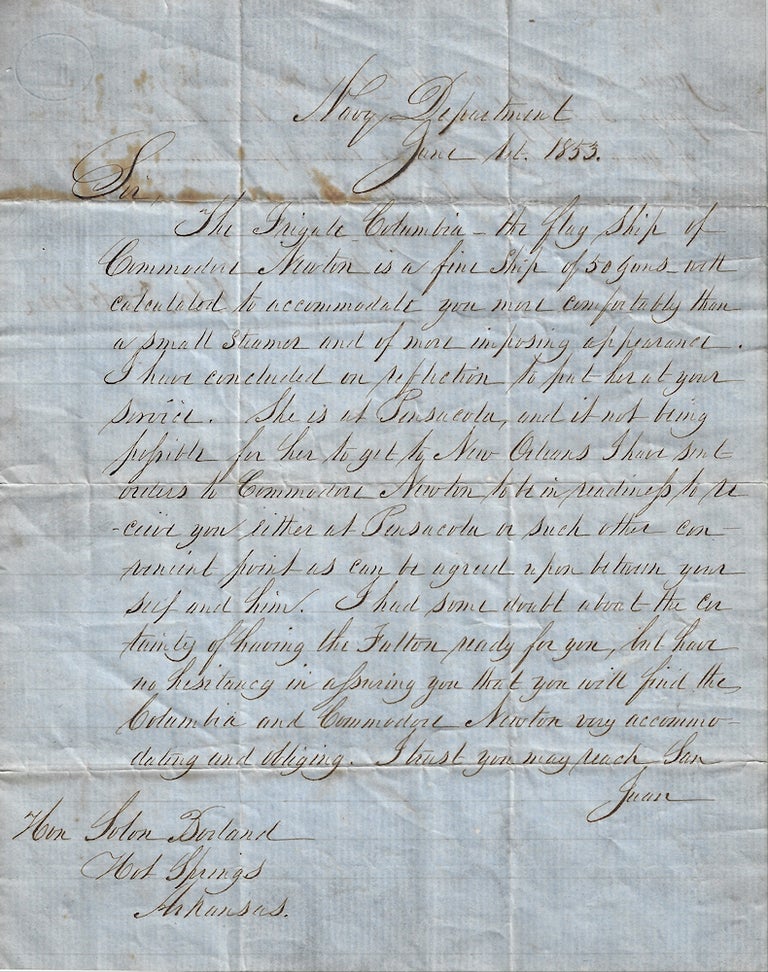1853 – Letter from the Secretary of the Navy placing the flagship of the Home Squadron at the disposal of one of the worst ambassadors ever appointed who destroyed U.S. credibility in Central America and whose diplomatic filibustering gave rise to William Walker’s attempt to conquer Nicaragua
Washington DC: 1853. Unbound. This one-page letter is datelined “Navy Department / June 1st. 1853.” It is addressed to the Honorable Solon Borland of Hot Springs, Arkansas and signed by James C. Dobbin, the Secretary of the Navy. There is no mailing envelope. The letter is in nice shape with some minor foxing.
Dobbin’s letter reads in part:
“The Frigate Columbia – the flag ship of Commodore Newton – is a fine ship of 50 guns – well calculated to accommodate you more comfortably than a small steamer and of more imposing appearance. I have concluded upon reflection to put her at your service. She is at Pensacola, and it not being possible for her to get to New Orleans I have sent orders to Commodore Newton to be in readiness to receive you either at Pensacola or such other convenient point. . .. I trust you may reach San Juan in safety and that your mission may prove successful and conducive to the honor of your Country and your reputation.”
Borland reached San Juan safely, but his mission was far from successful or honorable.
. Very good. Item #009932Borland, a Democratic senator from Arkansas, had helped secure the Presidency for Millard Fillmore and as a reward was appointed to be the first ambassador to Nicaragua. Like most members of the Democratic Party, Borland eyed U.S. expansion into Central America as an opportunity to increase the number of slaves states and thus guaranty its future control of the United States. However, his conduct not only outraged the Whigs, it infuriated President Franklin Pierce and embarrassed the rational members of his party.
Borland brought the U.S. within a hairbreadth of a war by threatening to attack to evict British interests from the Mosquito Coast with the intention that the United States would fill the resulting void. He alienated and terrified Central American republics by publicly proclaiming it was his “greatest ambition to see the State of Nicaragua forming a bright star in the flag of the United States." His over-zealous protection of the American-owned Accessory Transit Company helped drive Nicaragua into a civil war, which in turn, led to William Walker’s filibustering attempt to seize control of the country.
After Borland finally received a rebuke from the Secretary of State, he resigned his appointment, but before leaving he created an international incident that would harm U.S. relations with Nicaragua for years. Borland antagonized a group of Greytown officials angry that he had protected an Accessory Transit Company ship captain following his murder of a Nicaraguan during a boating accident. During the confrontation, Borland was struck by a thrown bottle, and the incident mushroomed into a U.S. naval bombardment of the city and the landing of a Marine detachment that burned what was left of the town.
Later, Borland served as a Confederate officer during the Civil War until after having one of his orders reversed, he resigned in anger and moved to Texas, where he died before the war’s end.
(For more information, see “Expansionism as Diplomacy: The Career of Solon Borland" in Central America 1853-1854” in "The Americas" Vol 40, No. 3.).
Price: $450.00






